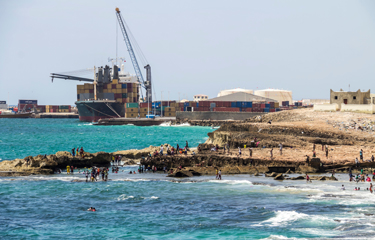A consortium of seafood companies, government, and a telecoms firm in Somalia are looking for Chinese investors to establish a port and processing hub to increase exports to China.
Abdul Mohamed at Djumla Consulting, which has offices in Mogadishu and Dubai, said the project will help Somalia by creating new jobs in Mogadishu area and by utilizing Chinese-based expertise, Mohamed said.
“We represent group of entrepreneurs from Somalia who are very interested to access the Chinese Sea Food Market,” Mohamed told SeafoodSource. “The aim of the preliminary project is to set up a joint venture, which is owned by Somalian Sea food investors and Chinese parties and which delivers variety of sea food products to be sold in China and other countries.”
Mohamed’s consortium includes 30 local seafood companies, local telecoms firm Hormood.com, and the Ministry of Fisheries and Marine Resources. It has assessed the potential of selling direct to Chinese consumers via e-commerce, explained Mohamed, “but eventually we think it will be wise to us to get a very strong local partner who already selling in local ecommerce and also help us all the technical barriers from our end.”
The joint venture will build facilities in Mogadishu for processing, cold storage, and for transporting “deep ocean” seafood products. Species listed in the consortium’s plans include bluefin and bigeye tuna, cuttlefish, crayfish, and mackerel.
Somalia boasts a 3,500-kilometer coastline in the strategic Horn of Africa where the continent meets the Middle East. China has built a military base in neighboring Djibouti.
A Somali/Soviet joint venture, the Las-Khorey Tuna plant operated off a 50-trawler fleet off the north-east coast in the 1980s before Somalia’s descent into civil war in the early 1990s.
“The fleet carried out bottom-trawling for fish, mainly, but also in a narrow belt in deeper waters for deep-sea lobster,” explains Abdul.
The Somali government granted fishing licenses to 31 Chinese vessels to exploit tuna and tuna-like species off its coast in return for licensing fees. Yet Somalia struggles to police its waters from industrial fishing fleet, despite many being scared off during a period heightened acts of piracy by Somali nationals over the last decade.
There are already several small-scale Chinese origin companies in Mogadishu and Puntland, Mohamed explained.
“As the China proposed Belt and Road Initiative is now underway, we are willing to invite Chinese companies to establish joint local fishery bases and participate in the plant construction of transshipment terminals on the basis of equal investment,” he said.







